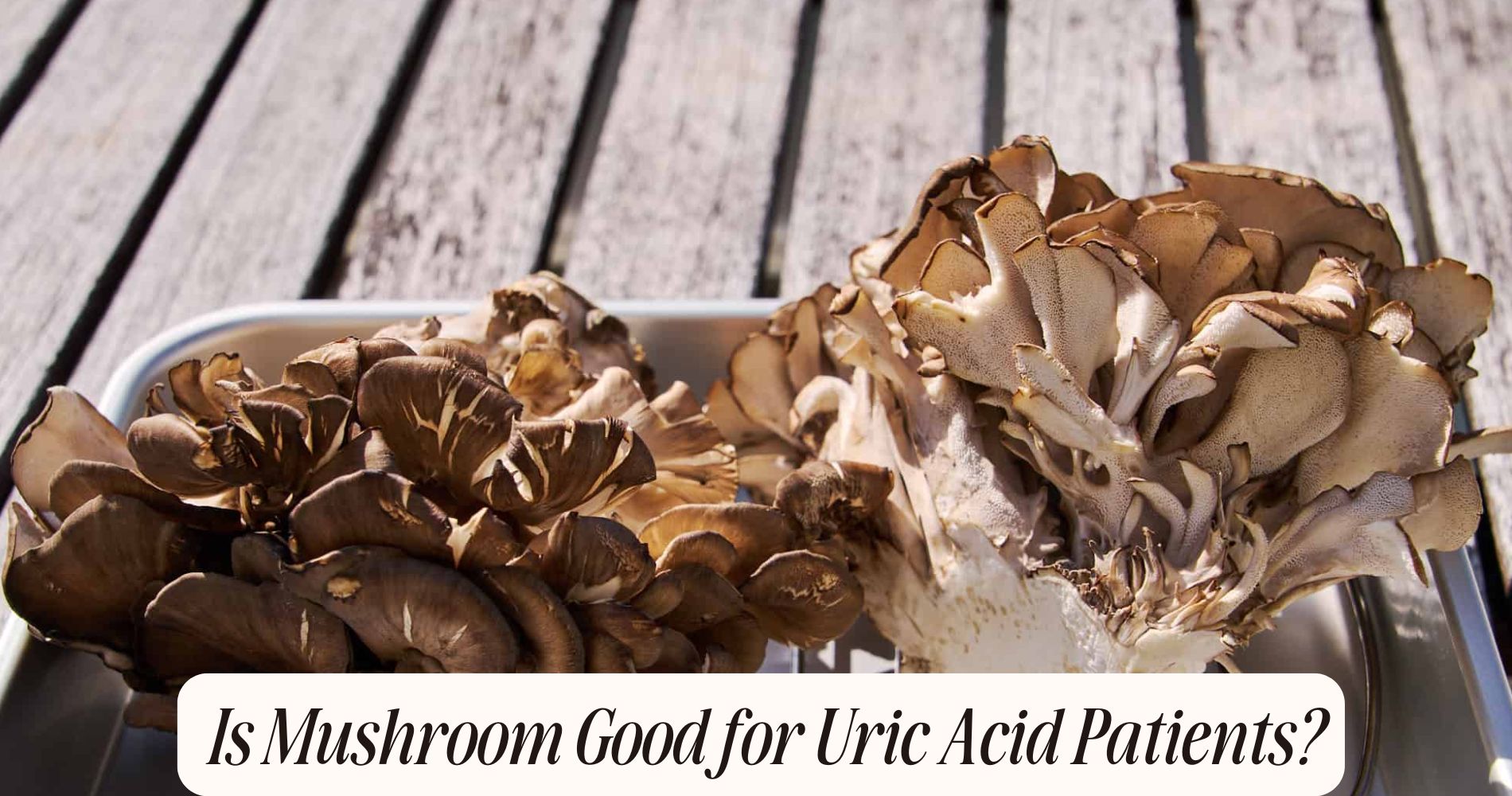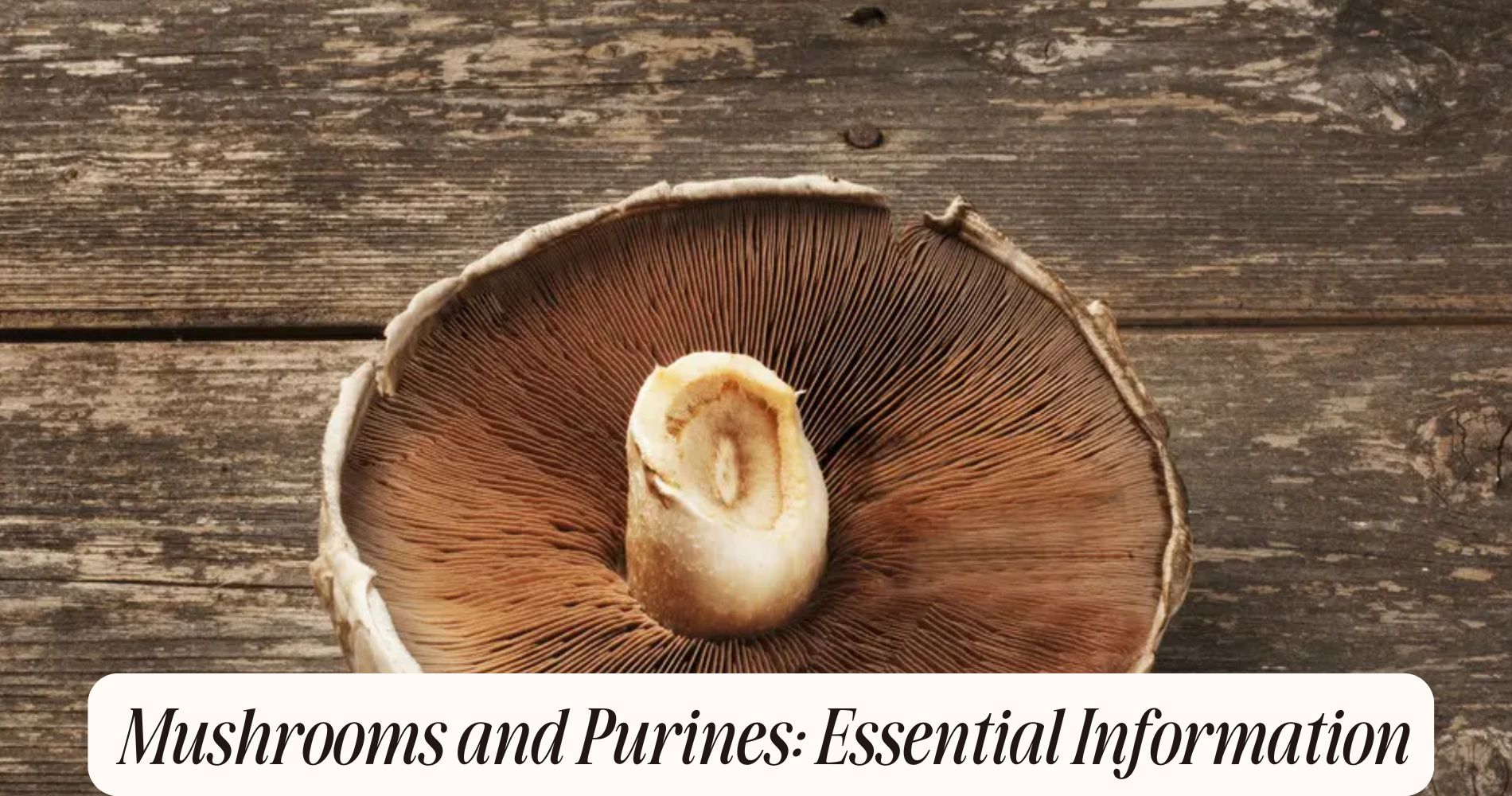
Mushrooms and Gout Attacks: What You Should Know
Understanding Gout and Its Causes
Gout's painful flare-ups can be traced back to a buildup of uric acid in the bloodstream, which results in the formation of sharp crystals in the joints. When these crystals accumulate, they can lead to intense pain, swelling, and redness, primarily affecting the big toe, but other joints can be involved too.
You may experience gout symptoms that often come on suddenly, often at night, leaving you unable to walk or even touch the affected area.
Understanding gout triggers is essential for managing this condition. Certain foods, like those high in purines, can elevate uric acid levels; these include red meats, shellfish, and sugary beverages.
Alcohol consumption, especially beer, can also contribute to increased uric acid production and limit its elimination. Additionally, dehydration and certain medications, such as diuretics, can exacerbate gout symptoms.
Stress and rapid weight loss may further increase your risk of an attack. By identifying and avoiding your personal triggers, you can take proactive steps in managing gout and reducing the frequency and severity of flare-ups.
Regular check-ups with your healthcare provider can help you stay on top of your condition.
The Role of Diet in Gout
When managing gout, your diet plays a vital role in controlling uric acid levels.
Consuming purine-rich foods can trigger gout attacks, while proper hydration and anti-inflammatory choices can help alleviate symptoms.
Purine-Rich Foods Impact
Understanding the impact of purine-rich foods can be important for managing gout effectively. Purines are compounds that break down into uric acid, and high levels can trigger gout attacks.
While you might enjoy various mushroom varieties, it's vital to be aware of their purine content. Some mushrooms, like shiitake and portobello, have moderate purine levels. In contrast, others, such as button mushrooms, are lower in purines.

In general, you should focus on balancing your diet to minimize purine intake. Foods high in purines include organ meats, certain fish, and some legumes. By limiting these, you can help manage your uric acid levels.
Incorporating low-purine foods—like vegetables, whole grains, and low-fat dairy—can provide you with important nutrients while keeping purine intake in check.
Hydration and Gout Management
Staying well-hydrated is essential for managing gout and can greatly influence your overall health. Proper hydration helps dilute uric acid in your bloodstream, making it easier for your kidneys to excrete. If you're not drinking enough fluids, you risk elevated uric acid levels, which can trigger painful gout attacks. Consequently, adopting effective hydration strategies is vital.
Aim for at least eight 8-ounce glasses of water daily, but adjust based on your individual needs, activity level, and climate. Incorporate hydrating foods like fruits and vegetables into your diet, as they contribute to your fluid intake.
Avoid excessive consumption of sugary drinks and alcohol, as these can exacerbate dehydration and increase uric acid levels.
If you're unsure about your hydration status, pay attention to the color of your urine; pale yellow indicates good hydration, while dark yellow suggests you need more fluids.
Anti-Inflammatory Dietary Choices
Making anti-inflammatory dietary choices can greatly impact your experience with gout. Research shows that incorporating specific foods can help reduce inflammation and lower uric acid levels, vital for managing gout.
Focus on whole foods, such as fruits, vegetables, and whole grains, which are naturally rich in vitamins, minerals, and antioxidants. You might want to include anti-inflammatory herbs like turmeric and ginger in your meals.
These herbs have compounds that can help reduce inflammation and potentially lessen gout flare-ups. Additionally, consider adding dietary supplements like omega-3 fatty acids, which are known for their anti-inflammatory properties. They can be found in fish oil or flaxseed oil supplements.
However, it's important to maintain a balanced diet. Limit your intake of purine-rich foods, such as red meat and certain seafood, as these can trigger gout attacks.
Staying away from sugary beverages and excessive alcohol can also be beneficial. By making these dietary adjustments, you can create an environment in your body that supports lower inflammation levels and better overall health, therefore effectively managing your gout symptoms.
What Are Purines?
Purines are organic compounds found in many foods and are essential for various bodily functions, including DNA synthesis and energy production. When you consume purine-rich foods, your body breaks them down through purine metabolism, resulting in the production of uric acid.
While uric acid is typically excreted through urine, excessive levels can lead to health issues, including gout attacks.
Common purine sources include red meats, organ meats, certain fish, and some legumes. These foods can notably contribute to your purine intake, so awareness of your diet is essential if you're prone to gout.
On the other hand, low-purine foods like vegetables, whole grains, and dairy can help manage uric acid levels effectively.
It's important to strike a balance; while purines are critical for health, moderation is key. If you notice gout symptoms, evaluating your dietary purine sources can help you manage your condition better.
Nutritional Profile of Mushrooms
Mushrooms are a nutrient-dense food that can be a valuable addition to your diet, especially if you're managing gout. They're low in calories and packed with essential vitamins and minerals. For instance, mushrooms provide B vitamins, such as riboflavin and niacin, which support energy metabolism and overall health. They also contain important minerals like selenium, copper, and potassium, contributing to your daily nutritional needs.
You'll find various mushroom varieties, each with unique flavors and textures. Common types like button, shiitake, and portobello not only enhance the taste of your meals but also offer distinct health benefits. For example, shiitake mushrooms are known for their immune-boosting properties.

Incorporating mushrooms into your meals can yield significant culinary benefits. They can serve as a meat substitute, adding depth to dishes while keeping them low in purines. Additionally, their umami flavor enhances the overall taste of your meals without the need for excessive salt or high-purine ingredients.
Mushrooms and Uric Acid Levels
Many people managing gout often worry about their uric acid levels, but incorporating mushrooms into your diet can be beneficial. Research indicates that various mushroom varieties, such as shiitake, portobello, and button mushrooms, contain low purine levels, which means they're less likely to elevate your uric acid levels compared to other foods.
Mushrooms are also rich in antioxidants and nutrients, like vitamin D and selenium, which may help reduce inflammation and support overall health. By including these fungi in your meals, you can enjoy a flavorful and nutritious addition without greatly impacting your uric acid levels.
However, it's crucial to maintain a balanced diet and consider how other foods interact with your uric acid levels. While mushrooms are a healthy option, focusing solely on them won't prevent gout attacks. Instead, think of mushrooms as one part of a thorough dietary strategy that includes hydration, low-purine foods, and moderation in other dietary choices.
Ultimately, experimenting with different mushroom varieties could lead you to discover new flavors and textures while supporting your health in managing gout effectively.
Types of Mushrooms and Their Effects
Understanding the different types of mushrooms can enhance your dietary choices when managing gout. There are numerous varieties, each with unique properties that may influence your health.
Culinary varieties such as button, shiitake, and portobello mushrooms are prevalent in many diets. These mushrooms are low in purines, making them a favorable option for those concerned about uric acid levels. They also provide essential nutrients like vitamins D and B, as well as antioxidants, which can support overall health.
On the other hand, medicinal mushrooms like reishi, lion's mane, and chaga offer additional health benefits. These mushrooms are often used for their anti-inflammatory and immune-boosting properties. While research on their specific effects on gout is still emerging, their potential to reduce inflammation could be beneficial.

It's crucial to take into account both culinary and medicinal mushrooms as part of a balanced diet. By choosing the right types, you can enjoy the flavors and potential health benefits while managing your gout effectively.
Always consult with your healthcare provider to verify that any dietary changes are appropriate for your situation.
Recommendations for Mushroom Consumption
Incorporating mushrooms into your diet can be a strategic choice for managing gout effectively. Certain mushroom varieties, such as shiitake and portobello, are low in purines, making them a suitable option for those concerned about uric acid levels.
When selecting mushrooms, consider the nutritional benefits they offer, including antioxidants and anti-inflammatory properties, which can be beneficial for overall health.
When it comes to cooking methods, aim for approaches that retain their nutritional value. Steaming, sautéing, or grilling mushrooms can enhance their flavor without introducing unhealthy fats.
Avoid frying or using heavy sauces, as these can contribute to elevated uric acid levels and counteract the benefits of mushrooms.
Start by incorporating mushrooms into salads, stir-fries, or as a meat substitute in various dishes. Experimenting with different mushroom varieties can keep your meals exciting while reaping the health benefits.
Remember to listen to your body; if you notice any adverse reactions, consult a healthcare professional. By making informed choices about mushroom consumption, you can enjoy their benefits while working to manage gout effectively.
Alternative Foods for Gout Management
While mushrooms can be a beneficial addition to your diet for managing gout, exploring other alternative foods can further support your efforts in controlling uric acid levels. Incorporating a variety of plant-based proteins, such as lentils, chickpeas, and quinoa, can be particularly helpful. These foods aren't only low in purines but also provide essential nutrients that promote overall health.
Additionally, fiber-rich foods like fruits, vegetables, and whole grains play a crucial role in gout management. Foods such as berries, cherries, and leafy greens can help reduce inflammation and lower uric acid levels. Incorporating foods high in vitamin C, like oranges and bell peppers, may also contribute to better uric acid control.
It's important to maintain a balanced diet, focusing on whole, unprocessed foods while minimizing high-purine options like red meats and certain seafood. Staying hydrated by drinking plenty of water can also support your body's ability to excrete uric acid efficiently.
Enhance Your Wellness with SUPER MUSHROOM GUMMIES
Looking for an easy and convenient way to incorporate the benefits of mushrooms into your routine? Try SUPER MUSHROOM GUMMIES from Well Gummies! Each vegan-friendly gummy is packed with 10 powerful functional mushrooms, known for its calming and immune-boosting properties.
These gummies do more than just support your immune system – they provide sustained, jitter-free energy, sharpen your focus, and promote mental clarity. And the best part? They taste like fresh wild berries, delivering the flavor of your favorite candy without the crash.
Fuel your brain and body naturally with SUPER MUSHROOM GUMMIES – the perfect companion to keep you balanced, energized, and shining all day long.
Frequently Asked Questions
Can Mushrooms Trigger Gout Attacks in Some Individuals?
Yes, mushrooms can trigger gout attacks in some individuals due to their purine content. Your individual sensitivities matter; if you notice flare-ups after consuming mushrooms, it's wise to limit or avoid them in your diet.
Are There Specific Mushroom Varieties to Avoid for Gout Sufferers?
If you're concerned about gout, it's wise to avoid mushroom varieties with high purine content, like shiitake and portobello. Opt for lower-purine options to help manage your symptoms and maintain better overall health.
How Do Cooking Methods Affect Mushrooms' Impact on Gout?
Cooking techniques greatly influence mushrooms' impact on gout. Steaming or sautéing can reduce purine levels, while frying may not. Proper mushroom preparation helps manage your diet, ensuring you enjoy them without increasing the risk of gout attacks.
Can Mushrooms Help Alleviate Gout Symptoms?
Mushrooms' nutrition offers anti-inflammatory properties, which may help alleviate gout symptoms. While they're not a cure, incorporating them into your diet could provide some relief and support your overall health. Always consult a healthcare professional first.
Is There a Safe Mushroom Supplement for Gout Management?
You can explore various mushroom types like reishi or lion's mane for potential supplement benefits. Consult your healthcare provider to guarantee safety and effectiveness, as individual responses to mushroom supplements can vary considerably in gout management.
Conclusion
To summarize, while mushrooms are often considered healthy, their purine content means you should consume them mindfully if you have gout. Moderation is key, and you may want to opt for lower-purine varieties. Monitoring your overall diet and including alternative foods can help manage uric acid levels effectively. Always consult with a healthcare professional for personalized advice, ensuring you make informed choices that support your health and gout management.




